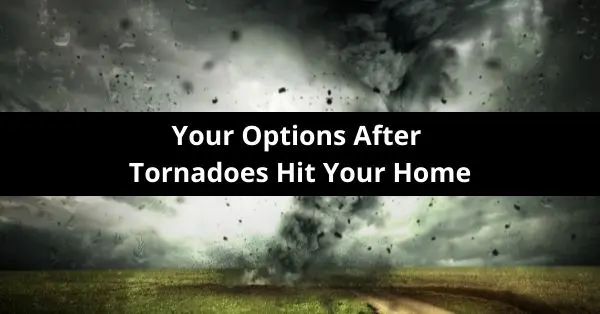Tornadoes are traumatic to live through. The aftermath can be equally as traumatic if you are not prepared to evaluate your options. Especially when you learn that insurance companies may not cover your house from tornado damage (aside from wind which is normally how a tornado is classified) as you can see here, here and here.
So what can you do after a tornado hits your home? Don’t panic! Think about your options and read your homeowners insurance policy.
Pro-tip: read the sections about natural disasters, wind damage and look for a flooding policy.
Homeowners insurance policies may cover downed trees from your own property, but what about your neighbors tree that damages your roof? Or what if the tornadoes caused flooding from the rainfall, busted pipes in your home that flood, or flash floods coming from creeks and rivers? Flooding may require you to have a flood insurance policy which is normally separate from regular homeowners insurance policies and that is how they get you! But there is hope and a solution no matter what your situation is.
Whether your house is completely gone, partially damaged or the physical appearance is fine but the roof and foundation may be compromised, we’re ready to help. Below you will find four tornado damage situations and solutions to help you navigate this tricky time in your life.
Your basement is flooded and the foundation is cracked
In this situation your insurance company may not cover the damage caused from the tornado as flooding is not the result of wind damage. And you’d need to prove the foundation issues came from the wind and not earth movements or the water exploiting the cracks in your foundation. This can be especially true if you live in colder climates where the water can freeze and further expand the cracks in concrete and cement.
And lets face it, insurance companies are not in the business of giving away money so it is going to be difficult to prove it when you’re stressed and they’re sitting “high and dry” in their offices. So what can you do?
The first option is to contact a bank or mortgage lender and see what types of rates you can get to repair your home and increase its weather resistance. If you can find a good personal loan or rate to refinance, you may want to keep your house and temporarily live in a hotel or rental home until the repairs are done. And make sure to shop for an additional policy that covers flooding and foundational problems caused by shifts in the earth and floods.
The second option is to sell your house. If you’re set for cash and are not in a rush, contact a real estate agent that specializes in “fixer uppers” but know you’re going to get a lower price than expected since the new owners will be repairing the home they’re about to live in. If you are in a rush you’ll want to contact a we buy houses company like ours who can get you a cash offer and fast. You may get a similar offer to using a real estate agent, but when you sell direct you cut out the middle-person and avoid having to pay commissions.
The reason we buy houses like this is that we’re going to fix all the damages and upgrade the home, but not live in it. We then sell the rehabilitated house for a profit later and that is where we recover our costs. A traditional home buyer you’d find through an agent plans on living in the house and not selling for a profit, so their offer will depend on how much damage they have to repair in addition to customizing the home for themselves. There is no profit in it for them.
A tree fell through the roof of a room
In this situation your best bet is not to sell if you want to stay in your home. Although roof repairs are not always cheap, if the tree or branch came from “wind damage” caused by the tornado, this may be covered by your insurance company.
You will probably be responsible for paying the deductible on your policy, but the insurance company might cover the rest of the cost from the tornado damage and also possibly pay for your hotel or home rental stay. But this depends on the policy you have.
If you’re concerned about your deductible going up, and the repairs are not excessively costly, you may want to consider paying for the repairs yourself. You could either pay it on your credit card and then pay your credit card off on time which may help to build your credit score. You can also see which vendors will offer a payment plan and also record timely payments to the credit bureaus. This may also help build your credit. Although the situation is bad, this is at least a positive that can work in your favor.
Everything is gone
If a tornado hits your home and there is nothing left, you do not have as many options. House flippers won’t be as interested because they cannot refurbish and rehab the structure, and it is costly to clear a lot. Not to mention they have to wait for inspections and the property to be cleared to begin work. But don’t panic.
First take a deep breath and remember you still own the land. Now it’s time to put on your detective gear and get ready to stack the cards in your favor.
Look for what assets your land may have hidden (literally beneath the surface) or where there is value.
- Precious minerals
- Oil
- If investors and land developers have been buying up lots quietly (this means there is demand soon)
- Neighbors that want to expand their property
- Your home could be used to block a view
Each of the above items can create value for someone else. If you don’t want to rebuild and just want to move on with your life, think about these assets.
If the view from your old home was a selling point and there is someone behind you slightly up a hill, let them know your land is for sale and someone may build a taller structure and block their view. Similar to the movie “Burlesque” there they sold the “air rights” to the people in the hills vs. having their views blocked.
Maybe you discover your city or county is investing in parks, schools and shopping centers, there is a chance land developers and real estate investors are buying land up. If homes were flattened by tornadoes like yours, they’re going to see this as the opportune time to buy. If you have the cash on hand to take the loss and buy something new, hold out on your land and sell it as these infrastructure products get developed. Once these projects happen the value of your land may also increase.
If you don’t have the cash on hand, then you may want to sell your house for cash quickly before everyone jumps on board to sell and the prices start to drop. Just make sure you contact a reputable house buyer with good reviews and third party ratings to help ensure you don’t get scammed.
A sinkhole opens up or the land shifts because a mine collapsed
This may sound more like fiction, but it can be very real. Read here. Sinkholes develop because the ground below the surface has a cavern (both naturally occurring and man made) that can no longer hold the weight of the earth and structures above. The heavy rainfall and flash floods from tornados can add to the pressure and open sinkholes. Especially if you live in an area that had mining as a leading industry in the past.
If your insurance company covers tornado damage but your policy does not cover sinkholes and other disasters as a result of the tornado, you have a tricky decision to make. Do you repair your tornado damaged home knowing the sinkhole may become a problem if your county doesn’t fix it, or do you sell? In this case it depends on how much you want to live in your home.
The first thing, after checking that your loved ones are all safe, is to get in contact with your town and county leadership to find out when and how they plan on repairing the sinkhole and if it is expected to get worse. If you do not feel confident in their answers, then you may want to sell. The sinkhole will continue to be a problem and not just for your house.
If you do feel confident in your community leadership then find contractors you trust to rebuild and repair your home, add upgrades to help prevent future damage, and find insurance policies that cover homeowner problems, tornados, floods and sinkhole damage. It is costly, but if you love where you live it is a necessary expense.
When a tornado hits your house it can be traumatic. Not only living through the noise and damage, but the aftermath and expenses. But now you are prepared with options for what to do when a tornado hits your house so you can be proactive and not have to sit there feeling helpless. And if you just want to sell, we will make you a hassle-free and no-risk offer if you call us at (877) 804-5252.


